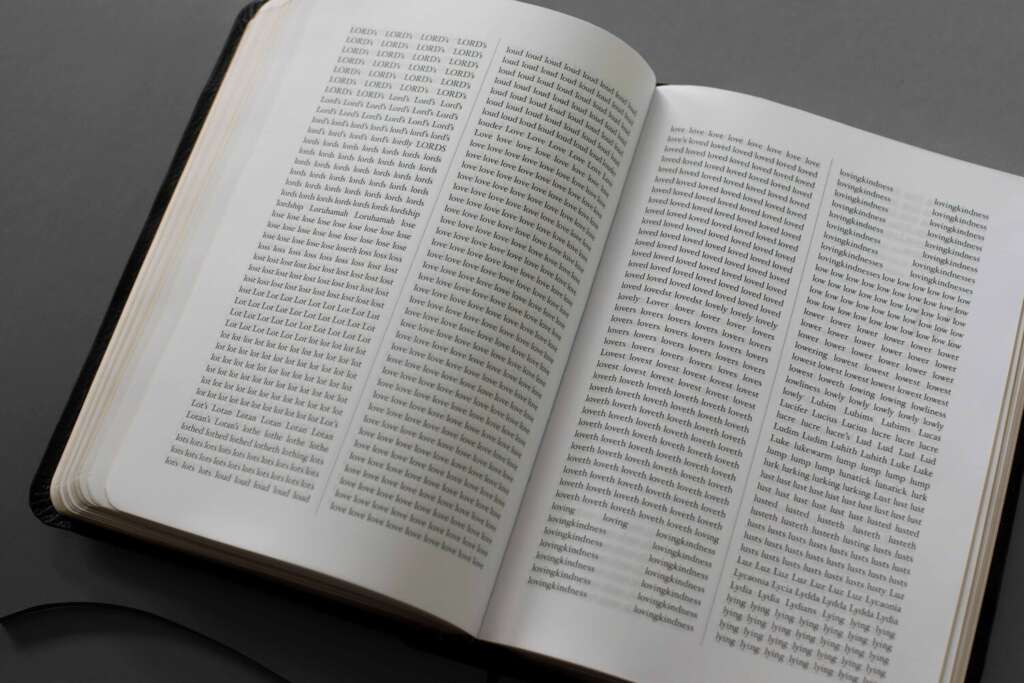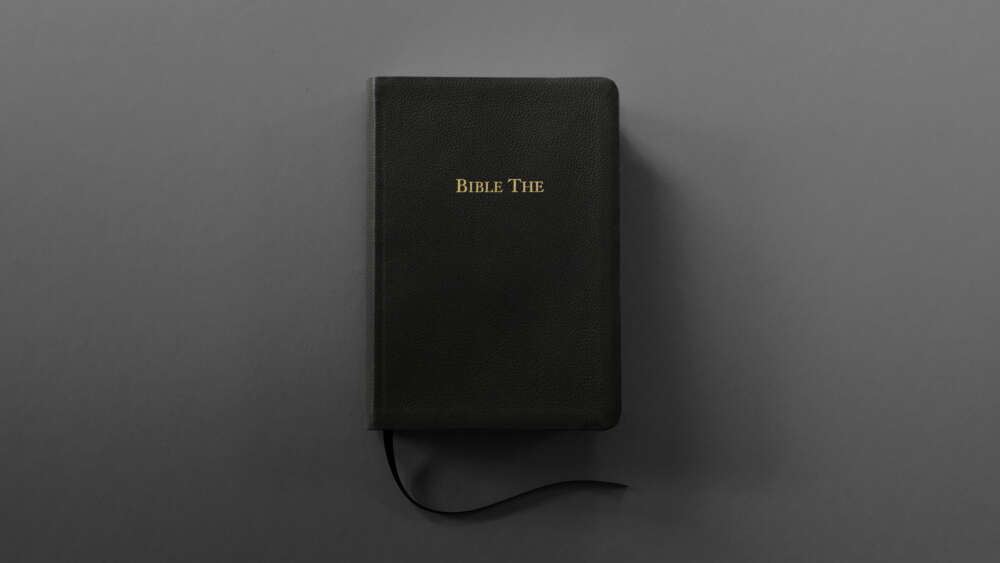New Bible rearranges words in alphabetical order to find new meaning
The full text of the King James Bible – all 1364 pages – has been wrangled into alphabetical order, in an attempt to turn the Bible into an objective, quantifiable work that can be easily analysed.
Joseph Ernst and Jan van Bruggen from Sideline Collective – a group of designers and artists who make “unconventional works” – chose the King James Bible as the first in an experimental series of “books to be transformed into data.”

The picked the King James translation due to its “material impact on humanity” and have called the end product “Bible The.”
“Using a custom-made piece of software, we take the entire text of a book and reorganise it alphabetically … This distils each text down to its lowest common denominator,” said the creative team in a statement.
“It highlights the importance people tend to place on the order of said words – and their meaning – and allows for new and interesting interpretations of the written word, in much the same way as an abstract painting might.”
According to Ernst and van Bruggen, the data suggests that the Bible skews towards a positive bias. For example, in the King James version, ‘Good’ is used 720 times, ‘bad’ only 18. ‘Love’ is used 308 times and ‘hate’ 87 times. And ‘happy’ less so, at 28 times, but still more than twice as much as the 11 uses of ‘sad’.
‘Right’ features 358 times, ‘wrong’ just 26. ‘Light’ features 272 times, ‘dark’ only 43. ‘Pleasure’ 61 times, ‘pain’ 25. And ‘Life’ 451 times, still more than the 371 instances of ‘death’.
This positive trait also translates into Biblical subject matter. For example, ‘Heaven’ features 582 times, whereas ‘hell’ only 54. There are 94 ‘angels’ to 55 ‘devils’, 96 ‘saints’ to 48 ‘sinners’, and 302 ‘blessed’ to a mere three ‘damned’, and a total of 27 ‘miracles’.
“What makes this particularly difficult is that it’s an English translation from two different original languages. The dilemma is that the original languages might use different words for these terms, or use metaphors or just different language and phrases.” – Jacqueline Grey
On the other hand, there are 1,394 instances of ’no’, whilst the word ‘yes’ only appears four times in the entire Bible. There are 269 ‘enemies’ to 49 ‘friends’, eight ‘liars’ and 51 ‘lies’. Also, there are 150 ‘heathens’, 63 ‘judged’, and 26 ‘guilty’, with 37 ‘crucified’, 30 ‘hanged’, and 71 ‘defiled’.
While there is no mention of ‘sex’ or ‘intercourse’ in the King James translation, there are 17 ‘concubines’, nine ‘adulterers’, eight ‘harlots’, four ‘sodomites’, three instances of ‘copulation’, three instances of ‘conception”, two ‘whores’, and one ‘prostitute’.
Socio-economically, there are twice as many ‘givers’ as ‘takers’ – 93 ‘poor’ and 81 ‘rich’, 77 ‘rulers’, 237 ‘prophets’, ‘30 nobles’, 480 ‘servants’, 400 ‘priests’, 30 ‘soldiers’, 17 ‘publicans’, 27 ‘workers’, five ‘lawyers’, nine carpenters, one ‘fishermen’, six ‘lepers’, three ‘beggars’, and one ‘slave’.
In terms of diversity, ‘White’ dominates by about 4:1, featuring 75 times, with ‘black’ just 18 times (although each mention may not refer to race or skin colour). “But the Bible does appear to feature a diverse cast,” say the creators of Bible The.
Among the Bibles inhabitants are 256 ‘Jews’, 254 ‘Philistines’, 98 ‘Egyptians’, 61 ‘Syrians’, 14 ‘Greeks’, 10 ‘Cushi’ (North Africans), 10 ‘Assyrians’, seven ‘Romans’, seven ‘Samaritans’, five ‘Persians’, four ‘Babylonians’, two ‘Libyans’, two ‘Christians’, one ‘Arab,’ and an equal amount of ‘believers’ and ‘infidels’.
Gender-wise, the data suggests the Bible is “overwhelmingly biased towards males,” according to the analysis.
At its most extreme, the Bible has 8,472 instances of the word ‘his’ and only a mere three instances of ‘hers.’ There are 1,653 references to ‘men’ and only 181 to ‘women.’
‘He’ is used 10,404 times, ‘she’ only 982. ‘Him’ 6,659 times to 1,994 uses of ‘her’. Only 252 ‘daughters’ to 1,094 ‘sons’, and only eight ‘mothers’ to 548 ‘fathers’. Only four uses of the term ‘lady,’ while ‘Lord’ has 7,830 uses. There are three ‘queens’ to 340 ‘kings’, and just five uses of ‘goddess’ to 4,440 uses of ‘god’.
Rev Professor Jacqueline Grey, Dean of Theology at Alphacrucis College (the national training college for Pentecostals) told Eternity that there’s not much this type of analysis is good for.
“All it does is similar to what a concordance might do – tell us how many times a word is used,” she said.
That can be helpful in some ways, such as seeing the Bible’s emphasis on particular things through the repetition of words. But according to Grey, there are several things to be wary of from such a data-focused experiment.
“What makes this particularly difficult is that it’s an English translation from two different original languages,” Grey explains. “The dilemma is that the original languages might use different words for these terms, or use metaphors or just different language and phrases.”
“We should approach our reading of the Bible with humility.” – Jacqueline Grey
Grey agreed with the initial interpretation that ‘Bible The’ gives, in that there is a lot about love.
“Overall, the Bible is a message of grace and a call towards love. So [the analysis] does very much reflect the overall message of the Bible,” says Gret.
“The very definition of who God is – God is love – is coming through there.
“But there are so many ways that love is expressed in the Bible. So many different expressions for how it is portrayed. It’s certainly not a full picture.”
Grey said the concept was “strange”, in that the alphabetised Bible isn’t really communicating anything in that form.
However, she notes that different approaches to the Bible can help us “see with new eyes.”
“Sometimes it also can be deeply important to read [the Bible] in new ways. That doesn’t mean we discard previous interpretations or don’t value the way the historic church has read the Bible, but we recognise that with new ways of viewing the world that does lead to new ways of reading the Bible.
“It helps us to acknowledge our own fallibility as humans. We should approach our reading of the Bible with humility.”





